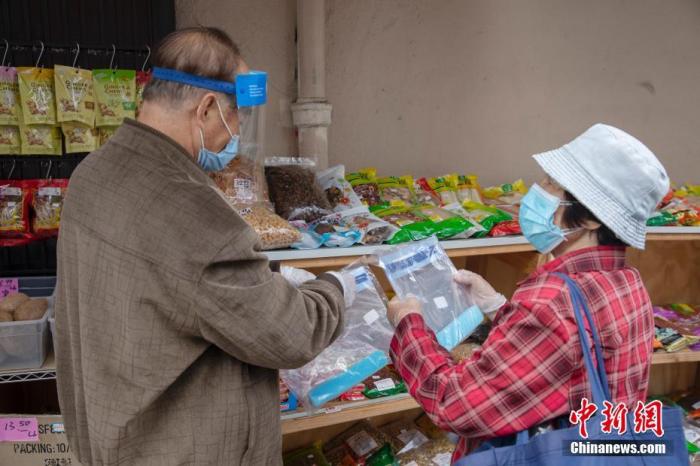China News Service, May 22, according to Reuters, a local Reuters / Ipsos poll on the 21st shows that a quarter of Americans have little or no vaccine for new coronavirus interest. In addition, about 36% of the respondents said that if President Trump said the vaccine was safe, their willingness to vaccinate would be reduced.
The report said that although medical experts said that to restore life to normal, a vaccine is needed to prevent infection, but the survey shows that the public has potential trust issues in the Trump administration. The Trump administration has been criticized for issuing often self-contradictory security guidelines during the epidemic.
On May 18th local time, an old man purchased anti-epidemic items in front of a stall outside a shop in San Francisco, China. China News Service reporter Liu Guanguan
According to reports, about 36% of the respondents said that if Trump said the vaccine was safe, their willingness to vaccinate would be reduced, compared with only 14% said they would be more interested in vaccination.
The survey was conducted from May 13th to 19th and involved 4,428 American adults. Most of the interviewees said that the guidelines of the US Food and Drug Administration (FDA), or the results of large-scale scientific studies showing the safety of vaccines, have a great impact on them.
Less than two-thirds of respondents said they were "very" or "somewhat" interested in vaccines. Given the increased awareness of the new coronavirus and more than 90,000 deaths from related diseases in the United States alone, some health experts had expected this percentage to be higher.
"Considering people's attention to the new coronavirus, this ratio is lower than I expected," said Dr. William Schaffner, an infectious disease and vaccine expert at Vanderbilt University Medical Center (VUMC), "I thought it would be To about 75%. "
14% of the respondents said they were not interested in vaccination at all, and 10% said they were not very interested. Another 11% expressed uncertainty.
Among those who expressed little or no interest in vaccines, nearly half said they were concerned about the speed of vaccine development. More than 40% think that the vaccine is more dangerous than the disease itself.

